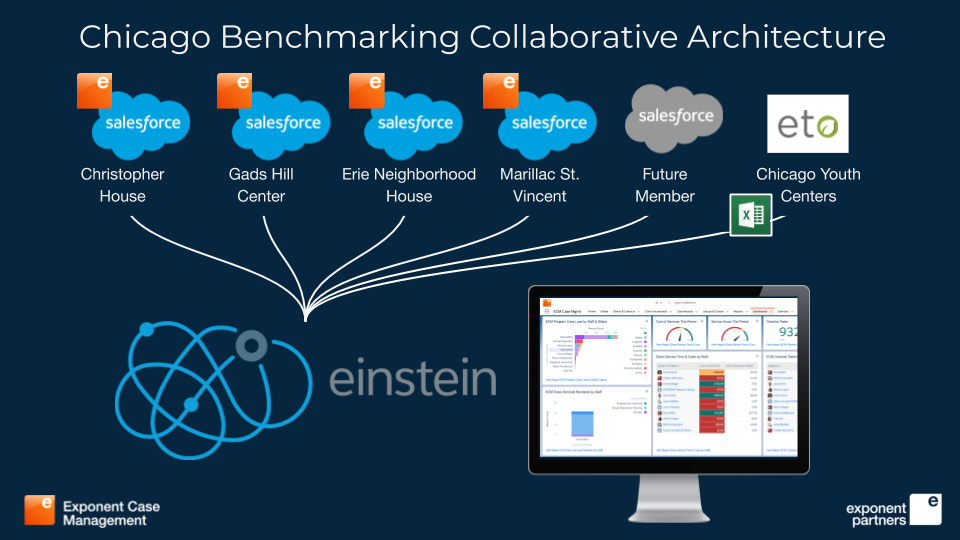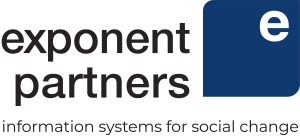Einstein Analytics: Chicago Benchmarking Collaborative
Chicago Benchmarking Collaborative (CBC) is an alliance of seven education and human service agencies dedicated to increasing the quality of services offered to low-income families in Chicago’s most underserved neighborhoods. Prior to launching the Salesforce platform with Exponent Case Management (ECM) and Einstein Analytics, time-consuming reporting meant infrequent benchmarking and lessened the value of the collaborative.
Exponent Partners implemented ECM for four CBC organizations thus far, plus a central benchmarking data warehouse powered by Einstein Analytics. Christopher House serves as both a member of CBC as well the Collaborative’s Project Manager. Now, with Einstein Analytics, Christopher House has a centralized dashboard with real-time data on the entire population being served across the collaborative.

Compared to the previous solution, Christopher House has reduced three reports into one report of anonymized, standardized data for benchmarking. In the past, Christopher House used to manually create data visualizations for sharing with the rest of the Collaborative. Now, the responsive Einstein Dashboards help them visualize the data in ways much more meaningful than a number or percentage. This provides the Collaborative with greater transparency and insights. Moving forward, all collaborative members can view and explore benchmark data.
Beyond Tracking Outcomes
One of CBC’s programs tracks teaching strategy, goals, and regular assessments for early childhood development and education. The ultimate goal is to prepare children for kindergarten, by focusing on three key domains: literacy, math, social-emotional, language, physical, and cognitive development. Using the filters built into their data model, Christopher House can drill down by location, agency, demographics, classroom, or students with an Individual Education Plans (IEP). This filtering ability allows the Collaborative to move beyond tracking standard program outcomes. They can now test or validate theories about early childhood development and teacher interventions.
Einstein Analytics Provides Actionable Insights for Teachers and Parents
Einstein Analytics allows the Collaborative to problem solve together and idea-share on the most effective strategies. For example, CBC found that data was trending low in children’s math readiness and, as a group, the Collaborative wanted to see improvement. One approach teachers developed was to increase the children’s exposure to math language.
The Collaborative’s model leverages peer learning communities. As part of this effort, a professional development program for teachers was opened up to all member agencies. Teachers participated in six weeks of cohort sessions with a teaching coach. Video analysis of classrooms before and after the program found that math language usage in the classroom grew. When children were using blocks to build a castle, for example, the conversations evolved to use math language, such as discussing the height of the castle tower or the perimeter of the castle’s moat.
Einstein Analytics also allows agencies to easily share data visualizations with parents for an immediate impact. Specifically, CBC’s data points on the “frequency of reading” by parents to the children in their programs found that children whose parents read to them five times per week versus one time per week had significantly higher literacy scores. The Collaborative can easily create a chart to share with parents to communicate this data. Parents respond positively to the charts and increase their literacy-based activities with their children. The data visualizations made possible by Einstein Analytics empower parents to take an active role in their child’s success.

Advice for Nonprofits Considering Einstein Analytics
“Einstein Analytics is ideal for agencies who have been using data for a few years with a solid model for tracking outcomes,” said Traci Stanley, Director of Quality Assurance at Christopher House. But a nonprofit’s relationship to data can be flexible, too. “Some organizations in our Collaborative are data-driven, while others are more data-informed, not necessarily driven. If your agency’s culture or program isn’t purely quantifiable, that’s OK, these tools can still inform your approach.”
Excitement about Einstein dashboards has spread across the Collaborative as agencies can see the potential in using advanced data visualizations for funder reports, board reports, and more. “Einstein provides efficiencies of our interventions. As a Collective, all agencies get to benefit from the benchmarking analysis while we share the cost across agencies,” she added.
Traci also described the value of working with a consulting partner during this process. “There is a clear benefit working with Exponent Partners. We may have ideas of what we want to track, but Exponent Partners has the knowledge to show us how to measure our impact and turn our ideas into a reality.”
Interested in learning more about collaboration and benchmarking data? In celebration of CBC’s 10th year, the Collaborative published a how-to guide to help other nonprofits increase their mission impact through collaboration. You can purchase the guide, Increasing Mission Impact Through Collaboration: Chicago Benchmarking Collaborative Processes and Toolkit, directly from the Christopher House website.
For more information about Exponent Case Management and Salesforce Einstein Analytics, contact us today.

